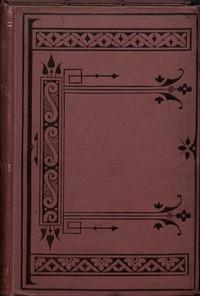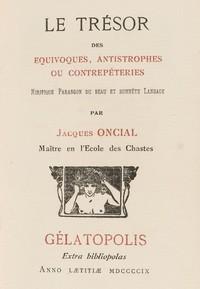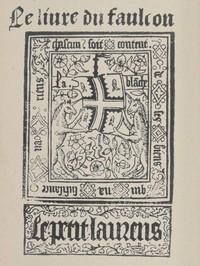Read this ebook for free! No credit card needed, absolutely nothing to pay.
Words: 2445 in 1 pages
This is an ebook sharing website. You can read the uploaded ebooks for free here. No credit cards needed, nothing to pay. If you want to own a digital copy of the ebook, or want to read offline with your favorite ebook-reader, then you can choose to buy and download the ebook.
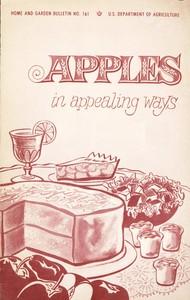

: Apples in Appealing Ways [1969] by United States Agricultural Research Service Human Nutrition Research Division - Cooking (Apples)
Unpublished-- Author's Private Copy.
On the Vice of Novel-Reading.
LOUISVILLE. KY.:
COURIER-JOURNAL JOB PRINTING COMPANY.
ON THE VICE OF NOVEL READING.
Ever since the Novel reached the stage of development where it was demonstrated to be the most ingenious vehicle yet designed for conveying the protean thought and fancy of man, there has stood in the judgment book of Public Opinion the decree that novel-reading was a vice. Of course, that judgment did not apply exclusively to the reading of novels. It was a sort of supplementary decree in which the name of this new invention was specifically added to the list of moral beguilements against which that judgment had anciently stood. Poetry, the Drama, even the virtuous History, had had their noses disjointed by this tribunal. But their great age and the familiarity of their presence had softened the decree in its enforcement. The Novel was a young offender in aspect , and was, besides, strong in masculinity and virility. A certain sympathy thus sprung up for the three quaint old ladies, as for old offenders whose persistence had won the wink of toleration. They actually achieved a certain factitious respectability in comparison with the fresher and more active dangers afforded by the Novel. But the Novel was simply a combination of all three, more flexible and adaptable. It, therefore, merely shares in the old judgment directed against everything in literature--and in all the arts--that displays the seductiveness of fancy or taste. The judgments of public opinion have been consistently in the line of distrusting and discrediting everything that appeared to be purely spiritual and intellectual, and that could not at once be organized into a political or religious institution or into a mechanical industry with the prospect of large sales and quick profits.
It is a curious exercise for persons immersed in writing and study as an occupation, and possessing a catholic tolerance for all occupations, to hark back to the time when they were still within the jurisdiction of the world that acts but does not study. In all the average towns, hamlets and country-sides of the world human nature beats with exactly the same pulse. If a change come, it comes slowly and it changes all together, so that all are still alike. In the small towns novel-reading has been considered about as contemptuously as playing the fiddle, though admitted to be less dangerous than family card-playing. It was estimated that a novel-reader was confirming his indolence, and in danger of coming to the poor-house; a fiddler was prophesied to get into jail for vagrancy or larceny; while a card-player had entered a path that might lead as far as the gallows and comprehend all the crimes. This opinion still largely exists in towns and country-sides. We find it maintaining itself even in large cities, among all sorts of very good people, even among the most exceptional men of business, of the professions and of the pulpits. Novel-reading, as a mental vice, according to this opinion, may be compared with opium-eating as a moral vice. It is thought to enervate and corrupt by means of a luxurious excitement, purely fictitious and temporary.
At an annual meeting of members of the public library of a large city, the librarian read the aggregate number of calls for books of each class during the year. Let us assume that there were calls for 65,000 works of fiction, 5,000 of history and biography, 2,000 of science and philosophy, and, say, 75 of theology. One of the trustees, who had pretentions as to responsibility for the public conscience that would have dwarfed the pyramid of Cheops, arose and appealed to the members to suggest a plan for counteracting the deplorable tendency of the times to the reading of fiction. It did not occur to anybody to recommend the abolition of the printing press, and so a discussion began. One of the most distinguished and scholarly ministers and educators of the world, who was a member, came to the rescue of the Novel. He said, in substance, that the large majority of the men and women in the world were laborers for the bread they ate, and it was his opinion that when such persons were resting after the day's toil, indulging their leisure, it was impossible to expect them to read works on theology and the abstruse sciences, while it was natural for them to seek amusement in novels and romances. He thought reading novels was much better than idle gossip, or loitering in saloons or in the streets. His remarks were received with great applause, and this declaration of his liberality of opinion was widely commented upon.
But is there any real liberality in considering the reading of novels as only just a better use of one's leisure than gossiping, guzzling in saloons or wandering idly about the streets?
The idea that novel-reading has no value except as a relaxation and amusement is born of the same dense and narrow ignorance which concludes that alcoholic drinks and wine serve no real purpose but to promote drunkenness and wife-beating; that opium promotes only luxurious debauchery, and that all the elegant, graceful and beautiful ceremonies and customs of society are invented merely to amuse and gratify the vain selfishness of the rich.
The most curious aspect of novel-reading, considered as a vice, is that the great majority of those indulging in it, like those who indulge in drinking, gambling and other vices, are themselves willing to admit that it is indefensible if less perilous than other vices. They excuse it, just as the distinguished minister did, as an amusement so harmless, as compared with other vices, that you may indulge it and yet skirt hell-fire by a margin of a million miles. Some hypocrites conceal and deny the indulgence like your secret toper; others apologize for not indulging when they are in the company of notorious but pleasing offenders, as the hypocrite feigns benevolence. Every one of you doubtless has in mind the amiable man of business--maybe your tailor, your broker, your banker, your lawyer, your grocer--who cultivates your good opinion, and for the sake of the customer in you tolerates lightly the doubtfulness of your employment. He will even introduce the subject of books as a respectful and diplomatic concession to your heresies--much as all of us humor lunatics amiably and curiously, by broaching the subject of their delusions. He is tolerant because of fat success; his income is large, he spends it in a fine house, full of costly adornments, of which he has no knowledge except in the measure of cost and the correctness of their usage; he has equipages, and gives dinners and sits securely in Abraham's bosom of society. He pays you the deferential compliment of asking what books you are reading. It maybe you are just out of the profound philosophical complexities and pathetic problems of "Les Miserables." Perhaps you have immersed yourself again in the paradoxes of "Vanity Fair," or have been pumping up the flabby tires of your better nature with the fresh air of "David Copperfield." It is possible that "Tess of the Durbervilles," or "A Window in Thrums" has been newly received, and has been enlightening your mind and conscience as to your relations to the world about you. Whatever it has been, you suggest the fact.
"It is a novel?" He replies doubtfully:
Free books android app tbrJar TBR JAR Read Free books online gutenberg
More posts by @FreeBooks
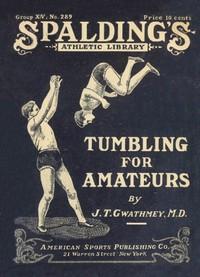

: Across the Vatna Jökull; or Scenes in Iceland Being a Description of Hitherto Unkown Regions by Watts William Lord - Iceland Description and travel
